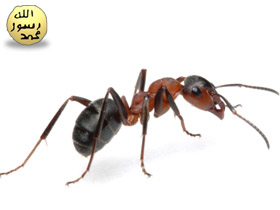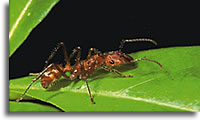The Qur'an indicates, when recounting Prophet Sulayman's (as) life, that ants have a communication system:
Then, when they reached the Valley of the Ants, an ant said: "Ants! Enter your dwellings, so that Sulayman and his troops do not crush you unwittingly." (Qur'an, 27: 18)
Scientific research into ants has revealed that these tiny animals have very organised social lives and that, as a requirement of that organisation, they also have a very complex communication network. For example, National Geographicreports that:
Huge and tiny, an ant carries in her head multiple sensory organs to pick up chemical and visual signals vital to colonies that may contain a million or more workers, all of which are female. The brain contains half a million nerve cells; eyes are compound; antennae act as nose and fingertips. Projections below the mouth sense taste; hairs respond to touch.159
Even if we are not aware of it, ants use a variety of methods to communicate, thanks to their very sensitive sensory organs. They use these organs at all times, from finding prey to following one another, and from building their nests to waging war. With 500,000 nerve cells squeezed into their 2-3 mm bodies, they possess a communications system that astonishes human beings.
The reactions in their communications have been divided into several specific categories: alarm, recruitment, grooming, exchange of oral and anal liquid, group effect, recognition, caste determination…160 Ants, which establish an ordered society by means of these reactions, live a life based on the mutual exchange of information. To bring about this exchange, they sometimes exhibit more flawless communication in areas that human beings often cannot resolve through speech, such as coming together, sharing, cleaning, and defence.
Ants mainly communicate on the chemical level. These semiochemicals, known as pheromones, are chemical compounds that are perceived by smell and secreted by internal glands. In addition, they play the most important role in organising ant societies. When an ant secretes a pheromone, the other ants receive it by means of smell or taste and duly respond. Research into ant pheromones has revealed that all signals are emitted according to the needs of the colony. Moreover, the intensity of the pheromone emitted also varies according to the urgency of the situation at hand.161
As we have seen, ants require a profound knowledge of chemistry to do what they do. The fact that the Qur'an emphasized this fact 1,400 years ago, a time when there was no such knowledge about ants, is another one of its scientific miracles.
159. National Geographic 165, no. 6, 777.
160. Bert Hölldobler and Edward O. Wilson, The Ants (Cambridge: Harvard University Press: 1990), 227.
161. Ibid., 244.



.jpg)
